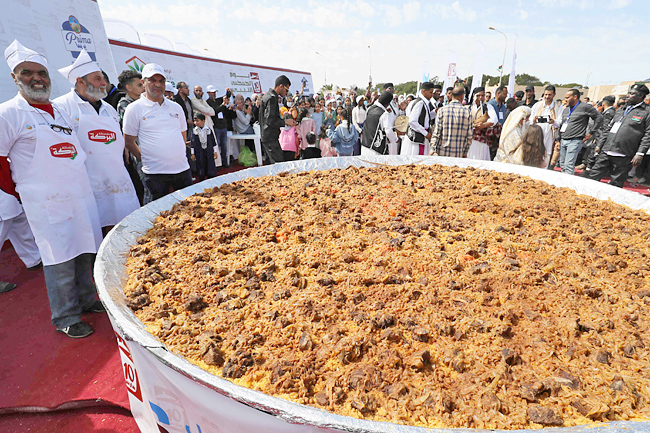SABRATHA, LIBYA (AFP) – Dozens of Libyan chefs are busy preparing a couscous platter the size of a large inflatable swimming pool as they seek international recognition for their country’s beloved dish.
“It’s part of our identity, our culture, our heritage and we’re proud of it,” said spectator Ahlam Fakhri, watching the four-metre diameter semolina dish take shape.
Couscous is an everyday staple in Libya and across North Africa’s Maghreb region. Originally a Berber speciality, it is made with hand-rolled semolina flour that is steamed and cooked, then served with a range of ingredients depending on region and individual tastes.
But it is more readily identified with Algeria, Mauritania, Morocco and Tunisia, which in 2020 jointly inscribed the dish on UNESCO’s list of intangible cultural heritage.
Conflict-scarred Libya missed out as the country remains mired in political crisis, with two rival camps claiming to be the country’s legitimate government.

Its couscous tradition has not been recognised by UNESCO as Libya is yet to ratify the UN’s cultural heritage convention.
In a bid to showcase Libya’s beloved couscous, the chefs held their giant cooking event this month at the site of the ancient Roman theatre of Sabratha.
The recipe combined 2,400 kilogrammes of semolina, mutton, pumpkin and “bossla” – caramelised onions cooked in clarified butter that are the signature touch to a Libyan couscous.
Families gathered happily for the event, which was guarded by police, while young people filmed the scene with their phones.
In hefty stainless steel pots, the cooks stirred the semolina, reddened by tomato juice, and heaped cooked ingredients onto platters.
“I haven’t slept all night,” said one of kitchen assistant, taking a short break on a garden chair with a tired smile on his face.
Fakhri was delighted to see Libyans come together for a day in a country that endured more than a decade of chaos following the 2011 overthrow and death of longtime dictator Moamer Kadhafi.
“I come from a village known for its couscous, which you can smell from far away,” said Fakhri, a well-travelled doctor from Tripoli.
“The whole of the Maghreb is renowned for its couscous, which distinguishes us from the Arab east.”
Ali Messaoud al-Ftimi, who organised the giant couscous, said he hosts similar events each year at different historical sites to send “a message to Parliament” that Libya should have its couscous recognised too.







